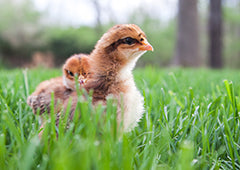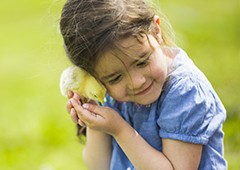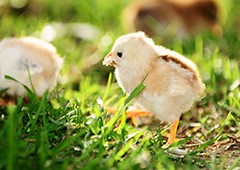We all know the age-old question- what came first, the chicken or the egg? And while this questions remains unanswered, there is a lot more to know about a chickens life cycle that we will happily clear up for you!
On average, a chicken will live between three to five years (some breeds are known to live longer), and have three distinct life phases: egg, chick and chicken stage. In each stage a chicken will have differing needs to ensure they continue to develop healthily throughout their lifetime.
Egg
To lay a clutch of fertilized eggs, a hen must have first mated with a rooster. The hen will then form an egg- a process which takes all of approximately 25 hours.
This process will begin with the formation of the egg yolk, it is produced by the hens ovary during the ovulation process- the yolk is referred to as the oocyte at this stage. As it travels down the oviduct, it will be fertilized internally by the sperm of the rooster.
As it continues to travel down the oviduct it becomes covered with a white membrane called ‘vitelline membrane’, as well as some layers of the egg white or ‘albumen’. Still travelling further down the oviduct, a casing for the egg white and yolk will begin to form. Eventually, the shell will be completely developed, and thus the egg is completely formed!
The hen will then lay this new life form in a comfortable and quiet spot. A hen will generally lay a clutch of approximately 12 eggs, with each egg being laid a day apart.
Chick
If hatching naturally, the mother hen will sit on the eggs to maintain the optimum temperature so they can develop until it is almost hatching time. Sometimes hens won’t take to sitting on their eggs, and so you may need to purchase an incubator and do this step yourself. We have plenty of incubating articles on our learning centre should you need to take over the role of mother hen!
The chick inside the egg will generally grow for 21 days, using the egg yolk as a means of nutrition as it grows. Along with sitting on the eggs, the hen will also use her beak to turn them to aid their development.
On about day 19 of the incubation period, the chicks will begin the pipping process. This involves the baby chick using their ‘egg tooth’ to peck a hole in the eggshell around the air sac to access oxygen, before pipping an area large enough for it to be free of its shell. This process can take up to 24 hours and should not be rushed.
The chicken will emerge with wet ‘down’ feathers, however they dry quickly, and will be extra fluffy and adorable in no time. Most chickens are able to stand and walk about straight after birth, however some may be a bit wobbly at first.
After birth, a baby chicken will need to be placed in a brooder- an indoor space that is heated up by the heat of an infrared lamp. The chickens will remain in the brooder for the first few weeks of their life- they will be fed in the brooder and sleep in the brooder, so it’s important it is cleaned regularly, so the chickens can remain at the height of their health.
A chick will start developing it’s first true feathers at around 5 days old, and at approximately 12 days the chick will begin to show defining breed bone development, as will it’s wing feathers. By day 18, the chicken should have significant feathering, and by day 30, it will have developed the characteristics that identify it with its breed.
Unfortunately many young roosters are discarded as soon as they can be sexed- especially if they were being bred for egg production. Some may be kept and raised for meat, or to produce the next generation of chickens, but for most this is not the case.
A chicken will continue to grow and develop- learning common chicken behaviours such as roosting and foraging under the guidance of their mothers. Within six months the bird will have developed all of it’s adult features, and is now considered a mature chicken.
Chicken
Younger hens are known as pullets and may be ready to lay as young as 18 weeks, however this will vary between breeds. All birds tend to come into lay earlier during periods of increasing sunlight, or later if they reach maturity in early winter.
A healthy and productive female hen will lay eggs until they are about 72 weeks old, however this will also depend on the period of their first moult.
Birds have an annual moult in which they lose their old feathers, a grow lovely new ones in their place. This generally occurs in late summer or early Autumn, and the result is a tatty and quite alarming looking bird. During moult, chickens will generally cease egg production, although they may lay one here and there, as all their energy and nutrients are going into producing a delightful new covering of feathers.
While many birds will start laying again in no time at all, older birds may be expended from their egg laying days, and their egg production will dwindle significantly.
As hens get older, they will start showing signs of their age. A wrinkled and dull face, heavy eyes, increasing rear size, and lack of energy are all possible indications that a chicken is approaching old age. Despite this, they will still remain the delightful creatures they once were through to their very last days.
So while we do not know whether the chicken or the egg came first, we do know that one does not exist without the other, and both make up the fascinating life-cycle of our favourite feathered friends!
Whatever the ages of your chooks, make sure that you've got the knowledge you need to raise a happy, healthy flock. Did you know 67% of chicken keepers surveyed experienced a chicken health or behaviour issue in the first 12 months that they didn’t know how to handle?
But don’t worry! Our feathered friends over at Chickenpedia have created a Chicken Healthcare Course. It is a comprehensive online course that covers everything you need, including what to look for in an unhealthy chicken and how to support your egg-laying hens to optimal health. All of their courses are really well structured, which is why I highly recommend them to all of my readers! From raising baby chicks to feeding to behavior, you’ll find valuable information that’ll give you the knowledge and confidence to successfully look after your chickens.
Check out Chickenpedia today. As a member, you will also get access to the ALL of their chicken courses!


















